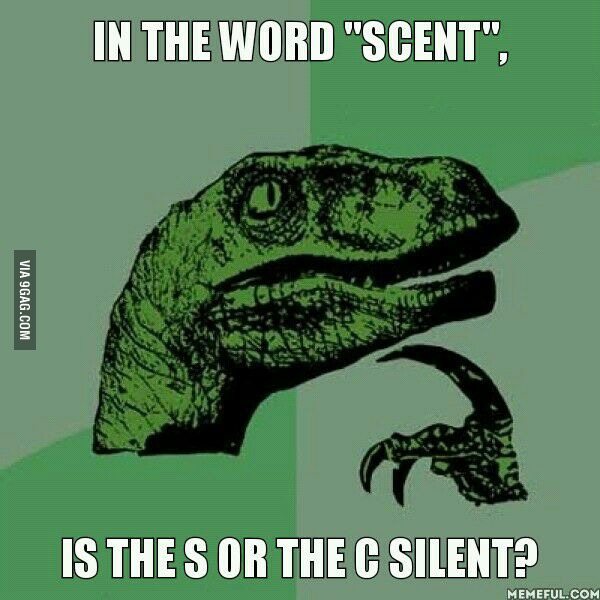So I saw a post on a funny pictures site...
"In the word "Scent", is the S or the C silent?"

In particular, how does the pronunciation of "scent" differ from "cent" and "sent"?
Small audio references would help me in particular.
So I saw a post on a funny pictures site...
"In the word "Scent", is the S or the C silent?"

In particular, how does the pronunciation of "scent" differ from "cent" and "sent"?
Small audio references would help me in particular.
User dawnhunter of Reddit writes in the /r/Showerthoughts/ thread called In the word "scent", is it the S or the C that is silent?:
Here's what a google search brings up:
late Middle English (denoting the sense of smell): from Old French sentir ‘perceive, smell,’ from Latin sentire . The addition of -c- (in the 17th century) is unexplained.
So the c is silent and also shouldn't really be there.
Also, further down the thread, another comment says:
The 'c' was probably added because that was the style at the time.
Originally a hunting term. The -c- appeared 17c., perhaps by influence of ascent, descent, etc., or by influence of science. This was a tendency in early Modern English, also in scythe and for a time threatening to make scite and scituate.
Speakers of the Queen's English have no trouble with this; if neither letter in "scent"were silent, it would be pronounced like the beginning of "sceptic". Actually, the C is silent, making the word (to all but Professor Higgins-level phoneticians) identical to "sent". Coincidentally, there is a funny little foreign coin, cent, that is pronounced the same way.
(I understand the question may be harder for those across the Atlantic; that is just one of the many disavantages of having left the British Empire all those years ago.)
Neither is silent.
The "s" and the "c" together make a softer "s" sound. Compared to the words "sent" and "cent", the word "scent" sounds more like "sscent."
Similar to the words "ascent" and "assent", where assent has a harder and faster sound.
Neither letter is silent. Both make the same sound /s/ And when two identical sounds are put together in the same word English, they are almost always said as if they were one sound. So we say [s] instead of [ss].
The fact that the C was added later is irrelevant, as it was likely added because it would not change the pronunciation of the word.
Silent letters in English were usually at one time pronounced (whether in English or the originating language). The P in pneumonia is silent because we don't say /pn/ at the beginning of words. The W in write is silent because we can't say /wr/.
Analyzing a letter as being silent is more of a last resort thing, what you do when no other rule of English orthography will work.
"Sc" in "scent" or "science" is used as a consonant digraph (two consonant combined to make one sound); therefore, neither are silent (they are being used as a consonant digraph). "Sc" in "scare" is used as a consonant blend (two consonants combined to make two different sounds), so the two different usages can't be compared effectively.